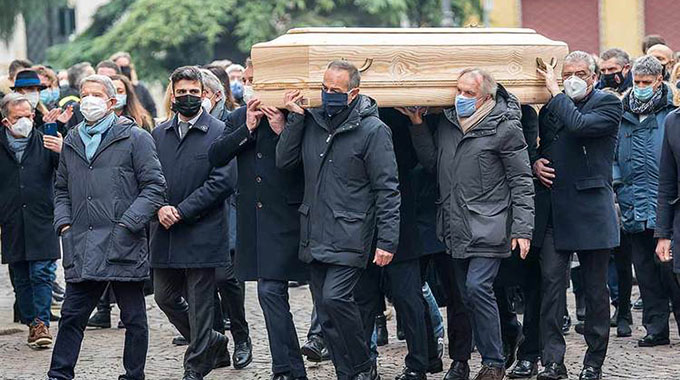Burial societies still relevant in Zim

Tafadzwa Zimoyo
Senior Lifestyle Writer
Culture is said to be dynamic, but there are some aspects that simply refuse to go because they would have become more than a lifestyle.
One such practice ,which has stood the test of time, especially in Harare’s high density suburbs, are burial societies.
Despite the advent of modern funeral services, some people in suburbs like Mbare, Mufakose, Dzivarasekwa, Mabvuku, Kambuzuma, Highfield and Epworth, are still hooked to burial societies.
Well, there could be many other reasons for their decisions, including that the modern funeral services offer fees that are way beyond the reach of many, but culture also plays an important role in the survival of burial societies.
Burial societies started taking root in Zimbabwe with the arrival of immigrants, mostly from Malawi and Mozambique, who were seeking jobs, while others were just fleeing away from family. Some ended up having inter-marriages with locals, resulting in the practise of burial societies being strengthened and appreciated. Burial societies are basically a group of people in the community who form a ‘society’ to cover funeral expenses when their next of kin dies.
Monthly contribution fees are paid to an elected treasurer of the burial society, who then disburses pay-outs upon the death of a member or dependant.
Gogo Abigail Musati (78), from Rugare suburb, said burial societies are still vital because they unite not only families, but societies. She has been a member of Umukulu-Nyoni Burial Society for the past 41 years.
“I buried my three children with the help of the burial society here in Rugare,” said Gogo Musati.
“Sometimes when things are tough, the society does not help with funeral processions only, the members are always by your side during the difficult times.
“It is no longer about burial only, the society can help with buying fruits and food stuff for those who are sick. The members even visit and console the bereaved, that is why I stick to the burial society.
“In your questions you seem to compare burial societies with funeral services providers, tell me one funeral service provider that sends workers to visit sick people who pay thousands of dollars to them every month?”
Gogo Musati said her son opened a funeral policy for her, which is being paid monthly, but she is continuing with her subscription of $6 at Umukulu-Nyoni Burial Society, which has 70 members.
“When we started, we were 13 families from our street,” she said.
“Most of our members are old people who are enjoying their pensions and we interact so well. We keep our books properly and I am up to date with my subscriptions. I hope to get a nice coffin from the burial society when I die.”
In some cases, burial societies, a tradition passed from generation to generation, are popular among Nyau dancers, especially in Mbare and Rugare suburbs.
“My friend, the Nyau dancers love and support each other in all things, including in death,” said a 36-year-old woman who only identified herself as Chaitezvi of Tichagarika Flats in Mbare.
She refused to say her actual name fearing reprisal from Nyau dancers in the area.
“But I am not of the Nyau practise,” said Chaitezvi.
“I only commented because you asked me to, please do not put my picture in the newspaper, the Nyau dancers will identify me and can come and sing the whole night at our flat.”
Chaitezvi said there were other people still practicing burial societies in Mbare, apart from Nyau dancers.
“In Mbare, I know of one burial society called Amayenge, and these people are well catered for by the burial society to the extend that they do not need funeral policies,” she said.
“When their member passes away they gather even under a tree and start planning the funeral.
“I heard they contribute US$10 a month and thanks to banking facilities, now they have a bank account.
“Gone are the days when they were used to keeping the money in a tin. For some, their children abroad would make them obtain funeral policies, but they still hang on to burial societies, while the funeral policy is being paid for.
“If you attend a funeral for a burial society member, there is no problem for food as they assist each other.”
But advocates of modern funeral services providers tend to discredit burial societies.
“The reason why these areas you have noted have people still practising the burial society culture is that most of the house owners there are of Malawian origin and they imparted that culture into their children who find it hard to adapt to change and join funeral policies,” said Takuranei Badza, an insurance and risk management consultant with a local firm.
“There is need to embark on an awareness campaign on the benefits of funeral policies rather than the old age burial society practise which is susceptible to corruption and loss of money.”
Well, Badza’s argument, being in the insurance sector, could be construed by some as trying to snatch more customers from competition posed by burial societies.
Another local insurance expert Jeff Jongwe said there was a general lack of trust within burial societies.
“Look here, these people live in the same society and watch each other’s developments in their social lives,” he said.
“Let’s say the treasurer upgrades his or her television set, other members develop a sense of mistrust. It’s a natural phenomenon in human beings, especially those less educated. I’m not stereotyping, but the originators of burial societies trekked down to Salisbury for menial jobs.
“Funeral policies are robust institutions and are more trustworthy. They have options like adding monthly providers to your funeral cover policy, and the family will be paid out a monthly amount of money that can go towards paying for groceries or education without necessarily someone dying.”
Contrary to the modern funeral policies advocates who dismiss burial societies, two South Africa-based sociologists, Lindiwe Ngcobo and Joseph Chisasa, authored a paper citing that burial societies have low risk of loss of money and were efficient.
“It has been proven that burial societies succeed due to their informal nature, which is characterised by a lack of lengthy and stringent formalities and low transaction costs when compared to formal financial institutions,” read part of their paper titled ‘The Nature and Benefits of Participating in Burial Society stokvels in South Africa’.
“The results also show that burial society’s stokvels empower women through providing opportunities for saving.”
For how long burial societies will hold on remains a matter of argument, but the fact is that they have been complimenting modern funeral services providers, although offering some form of competition for customers.
Some join burial societies because they cannot afford modern funeral services, while others do so as a matter of culture passed down from their fathers, yet for others it is just a matter of choice. But it remains that for now, burial societies are still holding fort in many societies, as they provide just more than funeral assistance.
Some have diversified to offer small loans to members, while other members of such burial societies pull their resources together to start businesses.
With such innovation, it seems burial societies will remain with us for a much longer time.









Comments